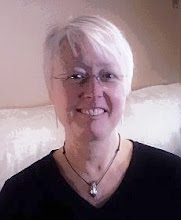 Recently some of the artists I know have been talking about "hibernating" or have expressed feelings of frustration or the need for change, etc. To this I say: take heart - it's all part of the natural ebb and flow of the creative process - sometimes we just need to be reminded of this. I wanted to share a book that I have found to be a great resource. It's called Trust the Process: An Artist's Guide to Letting Go by Shaun McNiff.
Recently some of the artists I know have been talking about "hibernating" or have expressed feelings of frustration or the need for change, etc. To this I say: take heart - it's all part of the natural ebb and flow of the creative process - sometimes we just need to be reminded of this. I wanted to share a book that I have found to be a great resource. It's called Trust the Process: An Artist's Guide to Letting Go by Shaun McNiff.It's not a how-to book or a step-by-step system. And while it addresses creative blocks, it's not only for those in the midst of one. It's more food for thought - ideas about how creativity works and how to tap into that which helps us nurture and explore our creative side. Maybe I like this book because I agree with a lot of what the author has to say. Most of what he says - but not all - fits with the way I think about the creative life.
One of the things that I've come to believe (and found confirmed in this book) is the concept what may appear as a "block" (or whatever label you might use) is really a period that is part of the process. I've learned to accept and even embrace those times when I feel less productive because in retrospect, I almost always see that they had a purpose.
McNiff talks about practice and preparation for art-making and likens it to an athlete training for an event. It seems that if you keep working, creating on even some small scale, that the process is helped - and this period functions as an "unconscious buildup for creation." He addresses the effects and importance of attitude - both positives and negatives - and risk taking, as part of the process.
He suggests that all creative people need not be "full-time artists," and that for some, having another "job" actually works to enhance their creative expression and cites examples. He reminds us that working in concert with other artists can enhance the experience - this is why some artists like to take classes. I have experienced this feeling and my students have had discussions about how working in a group acts as encouragement or helps them through a less inspired period.
McNiff talks about the concept of multiple forms of creative expression working together in the process. I know this to be true. I often move more toward music-making when my art-making feels less inspired. Sometimes I like to find other forms of creative expression for a while, whether it's photography, drawing or whatever - but understand that they are all part of the process and contribute in some way to the next inspiration in my favorite medium.
I highly recommend this book and hope that if you don't already, that you can learn to "trust the process." It's creatively freeing...






I have this book, too, Cathy, and find it helpful. Maybe it's time to dust it off and read through it again.
ReplyDeleteYou're such a good writer Cathy! I'll have to search this book out on Amazon, Lord knows I can probably use the words of wisdom. Although now that I have the new tiny workspace - I'm feeling a bit more inspired.
ReplyDeleteHave fun with the new uke! Bring it to Purdue. I'd love to hear you play it.
This sounds like an excellent book - I'll have to read it. I'm currently reading a similar book called "On Becoming an Artist" by Ellen Langer, a psychologist and artist. Her focus is on mindful creativity and the idea that anything we do can be creative if we do it mindfully. It's another one that's good to have and re-read every once in a while.
ReplyDeleteI agree completely. Not only the creative process is ahem, a process, but life itself also is, and one the not just ebbs and flows. It moves in a spiraling motion, which you can catch if you are attentive enough. Haven't read the book, but what you are saying makes total sense.
ReplyDeleteWhenever I feel “stuck” or frustrated, or it seems that life is not smiling at me, I have to remind me that life IS a process, and it goes on.